Navigation
Install the app
How to install the app on iOS
Follow along with the video below to see how to install our site as a web app on your home screen.
Note: This feature may not be available in some browsers.
More options
You are using an out of date browser. It may not display this or other websites correctly.
You should upgrade or use an alternative browser.
You should upgrade or use an alternative browser.
Who do they have in mind?
- Thread starter Guardian of the Mill
- Start date
- Status
- Not open for further replies.
Reformed Covenanter
Cancelled Commissioner
Not to mention the fact that Wilson has a history with Federal Visionism, which is as dangerously similar to Romish sacramentalism as anything out there.
I was just thinking the same thing before I read your post. The irony of complaining about Reformed fans of Thomas Aquinas serving as a gateway drug to Rome while discussing the subject with a Federal Visionist is not lost on me. The bottom line is that for all the good work that he has done in the past, James White has failed to defend the faith both in relation to cosying up to Federal Visionists and in his opposition to classical theism.
Alexander Suarez
Puritan Board Freshman
Jacob,Sure, but I do not think it has been centered on Thomas. Thomas will automatically receive the largest share of discussion simply because he was the most important thinker from Augustine to Calvin, and in terms of intellect, at least on one level, surpassed both.
Other guys have focused more on Scotus, but I remain unconvinced of his importance.

Notes on Reformed Thought on Free Choice
Asselt, Willem J. van. Reformed Thought on Freedom: The Concept of Free Choice in Early Modern Reformed Theology. Baker Academic, 2010. I think the criticisms of this book are overdone and largely …tentsofshem.wordpress.com
Here is what it comes down to:
All sides should agree with Turretin's discussion in Topic 1, questions 8-10. If White and Wilson cannot agree with Turretin on that point, the problem is with them, not us.
You may find this of interest. See Ryan Hurd's latest article on the Reformed use of Thomas here: https://adfontesjournal.com/web-exc...Ks_JwNWlrEtUMhMYzRbcbol5_a0YpwFVrwWCgcMsQiUiE
Here is an excerpt:
But something else is sobering: Protestant advocates of Thomas must face a reckoning, when the best of their tradition(s) e.g. the Reformed Orthodox often agree much less with Thomas than people today are imagining (and often quite loudly are claiming). In this sense, Protestant critics of this surge of Thomism in their ranks are perfectly right to divide the line here. Indeed, the Reformed Orthodox are an eclectic mix of competing theologies taped up together and trying to be new. And despite many studies about “Thomas’s influence on X Protestant theologian,” more often than not, Thomas and early-modern Protestants are apples and oranges, including when it comes to doctrine of God; and Thomas’s “influence” is more akin to Shakespeare’s influence on me and my English, although I have never studied and hardly read him.
Charles Johnson
Puritan Board Junior
Well, at least Hurd is honest that the Reformed are eclectic, and not Thomist. That's more than we get from most the Reformed Thomists. Although for Hurd, the solution seems to be pure Roman Catholic Thomism. His disdain for the Reformed as "competing theologies taped up together" is quite plainly showing.Jacob,
You may find this of interest. See Ryan Hurd's latest article on the Reformed use of Thomas here: https://adfontesjournal.com/web-exc...Ks_JwNWlrEtUMhMYzRbcbol5_a0YpwFVrwWCgcMsQiUiE
Here is an excerpt:
RamistThomist
Puritanboard Clerk
Ironically, both Hurd and James White/G3 agree on a point: any promotion of divine simplicity/inseparable operations is "Thomist." I disagree with Thomas on some points. As Charles noted, we are eclectic.Jacob,
You may find this of interest. See Ryan Hurd's latest article on the Reformed use of Thomas here: https://adfontesjournal.com/web-exc...Ks_JwNWlrEtUMhMYzRbcbol5_a0YpwFVrwWCgcMsQiUiE
Here is an excerpt:
Last summer I started a thread where we tried to work out the many nuances of the "Great Tradition." It ended up being a dumpster fire.
Charles Johnson
Puritan Board Junior
Hurd seems to be claiming in this most recent article that the Reformed view of simplicity is very different than the Thomist view.Ironically, both Hurd and James White/G3 agree on a point: any promotion of divine simplicity/inseparable operations is "Thomist." I disagree with Thomas on some points. As Charles noted, we are eclectic.
Last summer I started a thread where we tried to work out the many nuances of the "Great Tradition." It ended up being a dumpster fire.
Personally, I see the Reformed view of simplicity in just about everyone before the Reformation besides Scotus and Ockham.
This is what Hurd says:
"The Thomist teaching about that composition said of God through division, is (to speak Thomistically for a moment) a certain negation of a very certain Real Distinction (of esse and essentia), whose formal cause of such negation is a certain reason which involves act and potency; the non-subsistence of esse although it is the act before every act; essentia as the limit-feature of esse and its, so to speak, interiorly-posited restriction; and other very basic Thomist things. Again, obviously this is a bunch of “Thomist-speak,” but that is precisely the point: most of it the Reformed, who are rarely well-versed in Thomist metaphysics, do not know with any clarity. Now yes, all Reformed theologians had the good sense to be inclined, given the great medieval doctors before them, to the negative part of contradiction whenever “composition” and “God” were involved; but in this, they are thinking about very different things than Thomas. Here, “divine simplicity” is merely similar phrasing (common among a host of competing theologies), not necessarily similar understanding. And this is not even to mention differences as to “function” or usage of simplicity throughout theology proper, differences which were rather extreme."
Personally I find that paragraph completely unintelligible, beyond the idea that "Reformed simplicity is not Thomist simplicity," but I also find Hurd's neoscholastic sources like Báñez completely unintelligible, so perhaps that's not a surprise. It's actually remarkable how one can know enough Latin to read Augustine and Thomas with no problem, and then open up these neoscholastic works and be completely lost because of their obscure distinctions and obtuse style. And the student is not greater than his teacher, as the Lord said.
Alexander Suarez
Puritan Board Freshman
Hurd seems to be claiming in this most recent article that the Reformed view of simplicity is very different than the Thomist view.
Personally, I see the Reformed view of simplicity in just about everyone before the Reformation besides Scotus and Ockham.
For whatever it's worth, Tim Pawl argues that Thomas' version of divine simplicity is not necessary for "good theology" nor "orthodox theology."
- Status
- Not open for further replies.
Similar threads
- Replies
- 15
- Views
- 6K
- Replies
- 20
- Views
- 5K
- Replies
- 10
- Views
- 2K

